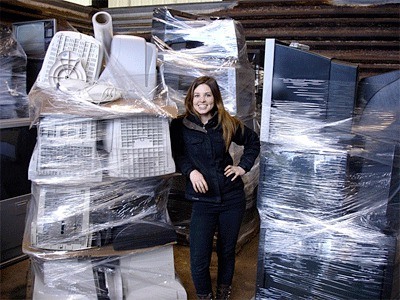One million pounds of old televisions, computers and monitors have now been collected in Island County under a program called E-Cycle Washington, started in January 2009.
The computer components collected are recycled and not headed for a landfill. Rather, those recovered electronics undergo dismantling and metals recovery starting at Total Reclaim in Seattle.
All of the processing and metals recovery takes place domestically with the exception of the leaded glass from cathode ray tube TVs and monitors which are made into new CRTs in India, as the U.S. no longer has a manufacturing plant. There is no charge to drop off the eligible electronics because collection and processing costs are paid by electronics manufacturers that sell in Washington State. Statewide, the E-Cycle Washington program collected 80 million pounds.
Island County’s Public Works/Solid Waste Division and its recycle contractor, Island Recycling of Freeland, have participated in the E-Cycle Washington program since its inception. E-Cycle Washington is a collaboration of industry, state and local governments, private collectors and processers that accept the eligible waste electronics from residents, charities, school districts, colleges, businesses and agencies. Businesses of more than 50 employees must work directly with a regional processor such as Total Reclaim.
Jerry Mingo, Recycle & Hazardous Waste coordinator for Island County Public Works, said in a news release that the county’s four participating sites, two of which are operated under contract with Island Recycling, collect an average about 375 pounds per day.
“Televisions account for 61 percent of the collected weight, monitors 29 percent, and computer towers and laptops 10 percent,” he said.
The million pounds of E-Cycle waste have been collected at the Oak Harbor Transfer Station, Camano Island Transfer Station, Solid Waste Complex Recycle Park near Coupeville and at Island Recycling in Freeland. Visit www.recyclewhidbey.net, or call 679-7386.
The four types of eligible electronics (TVs, monitors, computer towers and laptops) were chosen for industry-sponsored collection because they are relatively high in toxic and persistent metals and compounds including phosphor, barium, polyvinyl chloride, bromine, cadmium, mercury, beryllium, lead and hexavalent chromium.
These toxic components do not break down in the environment and bio-accumulate in the food chain when improperly disposed.
“This is juicy stuff in our industry,” said Mingo. “This is an example of an industry taking responsibility for the end fate of products after their useful life.”
The rechargeable battery and print cartridge industries also practice producer responsibility by sponsoring take back programs.
In Washington State, mercury bearing lamp manufacturers will begin funding lamp collection in 2013, and there is currently a bill before the Washington State Senate to ask the pharmaceutical industry to provide take-back opportunity for unwanted medications.
The Washington State Department of Ecology claims that in 1970 there was one television per household. Today the department estimates that there is one TV for each person, and more than one computer per person. In 2009, they estimate that 365,000 televisions and 780,000 computers reached the end of their life in Washington State.



